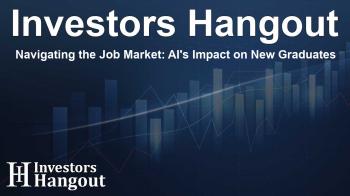Navigating the Job Market: AI's Impact on New Graduates

The Changing Landscape of the Job Market
Today’s college graduates are stepping into a vastly different job market than what previous generations experienced. The rise of artificial intelligence (AI) has transformed many entry-level roles, making it essential for new graduates to adapt quickly. The employment environment they encounter is marked by remarkable changes, with technology now handling a variety of tasks that have traditionally been carried out by humans.
Shifts in Unemployment Rates for Young Graduates
Recent reports show that the unemployment rate for college graduates aged 22 to 27 has reached concerning levels. Instead of a typical smooth transition into the workforce, these young professionals are finding it increasingly challenging to secure stable positions. Current data illustrates a marked increase in joblessness among graduates compared to just a few years prior, indicating a significant shift in the employment landscape.
Survey Insights on Employer Hiring Trends
A survey from a respected organization found that a substantial majority of employers intend to either maintain their current levels of entry-level hiring or reduce them further. Various factors contribute to this trend, including a tight labor market and a surge in the adoption of AI technologies. As a result, many companies are rethinking their needs for entry-level talent.
Identifying Vulnerable Job Sectors
Certain job roles are significantly more threatened by automation than others. According to occupational statistics, jobs involving manual or repetitive tasks are particularly at risk. This includes positions in fast food, retail, and entry-level administrative work that are becoming increasingly automated due to efficiency-focused technologies.
The Rise of Jobs Requiring New Skill Sets
In contrast, professions that demand creativity, human interaction, or specialized expertise are less likely to face automation. Fields like journalism, healthcare, and specialized technical services remain in demand, illustrating a shift toward roles that require uniquely human skills.
The Emergence of the Digital Economy
In light of these changes, a new type of job market has begun to take form, often referred to as the “digital economy.” This environment is characterized by roles that revolve around technology and digital devices, moving away from traditional physical jobs. While these opportunities can provide flexibility and new experiences, they also pose unique challenges such as job insecurity and inadequate labor protections.
Challenges for Young Professionals
For many young professionals, especially those lacking specialized technical skills, the digital economy presents obstacles that can affect mental health and overall job satisfaction. The experience often comes without the security and benefits associated with traditional employment, leaving many graduates feeling uncertain about their future.
The Potential for Job Creation Amidst Transformation
While it may seem that automation solely threatens jobs, there is potential for new job growth if organizations take a proactive approach. Sectors such as renewable energy, cybersecurity, and digital health represent exciting opportunities for fresh graduates if investment in training and education increases.
Encouraging Collaboration Between Sectors
To navigate this changing job market effectively, public and private sectors must work together. This collaboration is crucial to retrain workers and adapt educational programs, ensuring that the workforce is equipped to meet the demands of the future economy.
AI's Impact on Global Aspirations
As we look at the broader implications of AI, it’s vital to consider its potential impact on global initiatives aimed at addressing issues such as education and health. While AI can significantly contribute to achieving some of these goals, it also risks exacerbating challenges related to inequality if not managed with care.
Responsibility in AI Implementation
The duality of AI’s role emphasizes the importance of establishing ethical guidelines for its usage. Without appropriate regulations, AI could deepen societal divides, yet with responsible practices, it has the power to enhance global well-being and efficiency.
Frequently Asked Questions
How is AI affecting entry-level job opportunities?
AI has automated many tasks traditionally filled by entry-level workers, causing a decline in available jobs in this sector.
What skills are important for today’s graduates?
Skills related to technology, creativity, and high social interaction are increasingly vital as job roles evolve.
What sectors are growing due to AI?
Sectors like renewable energy, cybersecurity, and AI governance are emerging as important areas for job growth.
How can graduates improve their job prospects?
Graduates can enhance their job prospects by gaining specialized skills and embracing lifelong learning in technology-related fields.
What role does collaboration play in the future job market?
Collaboration between public and private sectors is crucial for retraining workers and creating relevant educational curricula aligned with future job needs.
About The Author
Contact Logan Wright privately here. Or send an email with ATTN: Logan Wright as the subject to contact@investorshangout.com.
About Investors Hangout
Investors Hangout is a leading online stock forum for financial discussion and learning, offering a wide range of free tools and resources. It draws in traders of all levels, who exchange market knowledge, investigate trading tactics, and keep an eye on industry developments in real time. Featuring financial articles, stock message boards, quotes, charts, company profiles, and live news updates. Through cooperative learning and a wealth of informational resources, it helps users from novices creating their first portfolios to experts honing their techniques. Join Investors Hangout today: https://investorshangout.com/
The content of this article is based on factual, publicly available information and does not represent legal, financial, or investment advice. Investors Hangout does not offer financial advice, and the author is not a licensed financial advisor. Consult a qualified advisor before making any financial or investment decisions based on this article. This article should not be considered advice to purchase, sell, or hold any securities or other investments. If any of the material provided here is inaccurate, please contact us for corrections.

